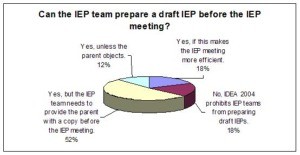|
March 21, 2007
ISSN: 1538-3202
Issue: 382
Subscribers: 46,227 |
|
| |
More
From Wrightslaw | |
Evaluations
IEPs
Law Library
Advocacy
IDEA 2004
NCLB |
|
Training Schedule |
| |
 |
| Contact
Info | |
Pete and Pam Wright
Wrightslaw
& The Special Ed Advocate
P. O. Box 1008
Deltaville, VA 23043 |
|
 |
Website |
|
 |
Email |
| | |
| Copyright
© 2007, Peter W. D. Wright and Pamela Darr Wright. All rights reserved. Please
do NOT reprint or host on your website without explicit permission. |
|
At
Wrightslaw, our mission is to
help you gain the knowledge and skills you need to navigate the confusing,
changing world of special education.
The Special Ed Advocate is the only weekly e-zine with up-to-date, accurate
information about special education law and advocacy, cases, tactics and
strategies.
Published continuously since April 1998, subscribers receive alerts
about new decisions,
events, and special offers on
Wrightslaw publications and products.
Sign up free today!
|
|
In This Issue: |
| |
| |
How to Use Test Scores to Measure Educational Progress and FAPE |
Assume your child began receiving special
education services three years ago. Is your child making progress? Is your child
catching up with the peer group? Has your child fallen further behind? Is your child receiving a free appropriate public education (FAPE)?
How do you know?
Do you know your child’s standard scores, percentile ranks, subtest scores, and
age and grade equivalents on the most recent evaluation? Have you compared these scores with earlier testing?
Parents,
teachers, and advocates must learn how to measure educational progress. If you
do not learn how to use information from tests to track your child's progress,
you will not be able to play an active role in planning your child's special
education program. Your biggest obstacle is likely to be your own fear that you
can’t understand this material. You need to overcome that fear.
What can you do? Read “Tests
& Measurements for the Parent, Teacher, Advocate and Attorney” -- three
times. Use a highlighter. Make notes in the margins. Reading the material three times is the key to success.
After you have read the article or chapters three times, get the evaluations and
tests on your child. Compare tests that have been administered more than once.
What's the verdict? Is your child learning and making acceptable progress? Has your child fallen further behind?
NOTE: Because this information is so
important, we included two chapters about Tests & Measurements in our book,
Wrightslaw: From
Emotions To Advocacy. The book also includes “Homework Assignments” to
help you master this material.
Learn more about
evaluations and assessments. | |
back to the top |
| |
We Can Train Shamu but We Can't Teach a Child to Read? | |
Dr. Bill Matthew, director of special education in
California, offers this memorable description of educational
decision-making and effective educational programs:
“We can train Shamu but we can't train a kid to be
compliant or to read? Give me a break! Educational decision-making should be
empirically driven - not driven by intuition (or tarot card reading) . . .”
In We Can Train Shamu! Educational
Decision-Making, Testing, and Advocacy, Dr. Matthew shares concerns about
special education, assessments, projective personality testing.
He also discusses advocacy issues and psychological treatment for kids with emotional
disorders.
Dr. Matthew also offers advice about assessment issues:
- Age & grade equivalents
- Subtest scatter
- Inappropriate use of projective tests
- Use of psychometrically sound tests
Learn more about research based
instructional programs. | |
back to the top |
| |
Last Week’s Poll Results | |
Last week, we asked our readers to
answer a quick poll question related to Draft IEPs. The question was "Can
the IEP team prepare a draft IEP before the IEP meeting?"
Fifty-two percent of you chose the answer
"Yes, but the IEP team needs to provide the parent with a copy before the IEP
meeting" - the correct answer. Congratulations!
We have a new question for you this week. See the Quick Poll on the left side of this newsletter. If you don't see the question, your email program may have blocked it. Check the newsletter on the web site to take this week's poll.
| |
back to the top |
| |
The Lighter Side Of Special Ed: Parents and Kids |
| Before you read The Lighter Side of Special Ed: Parents and Kids by Aimee Gilman, be warned. As Aimee says, "If you are among
those humor-challenged individuals who believe THERE IS ABSOLUTELY NOTHING
FUNNY ABOUT DISABILITIES, I urge you to stop now and go back to biting your
nails down to your elbows. I understand how you feel."
Aimee Gilman is an attorney who represents kids with
disabilities and the parent of a child with a disability. She is also very
funny.
Read Aimee’s view of The Lighter Side of Special Ed: Parents and Kids.
|
|
back to the top |
| |
Recommended Resource:
Daily EdNews |
U. S. Dept of Education
Sued Over Student Loans
“A computer glitch apparently causes more than 3 million borrowers to be
billed hundreds of millions more than they owed. The U.S. Department of
Education has overcharged millions of Americans with student loans during the
past decade despite repeated warnings that it was breaking the law, according
to a lawsuit filed yesterday.”
How did we learn about this new lawsuit against the U. S. Department of Education? We
subscribe to Daily EdNews, a free e-zine that’s delivered to our email box
every morning.
Daily EdNews covers top education news, current education issues, and offers
an analysis of events and policies that affect education. Daily EdNews is a
great resource!
Sign up for Daily
EdNews at
http://www.ednews.org/pages/signup-today.html. You can learn more about Daily
EdNews at http://www.ednews.org/
 |
|
back to the top |
|
| We
are scheduling programs for 2007 and 2008. If you are interested in bringing a
Wrightslaw program to your community, please read our Conference
Information page. |
|
back
to the top |
|







